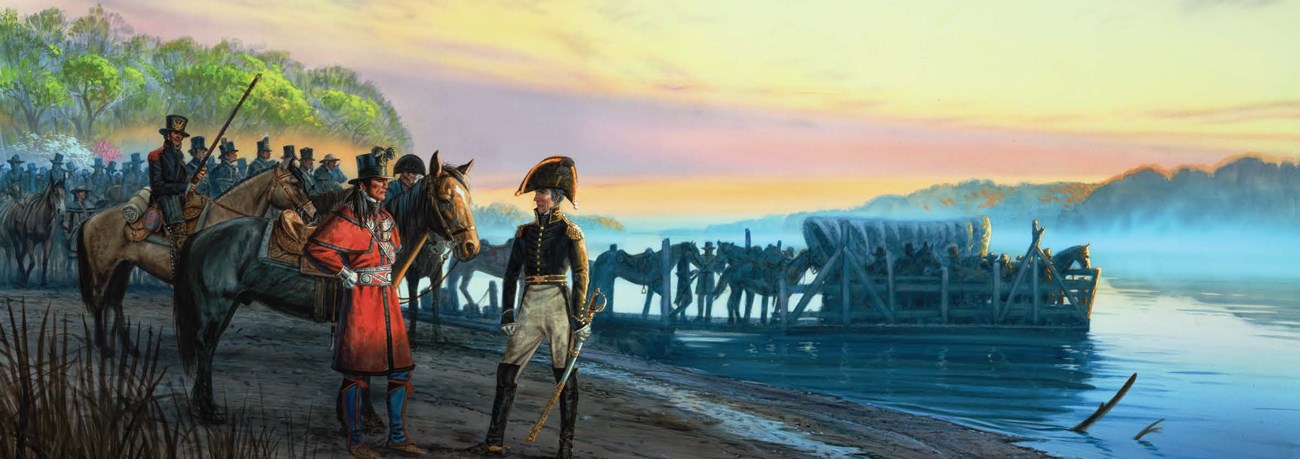
©Michael Haynes/NPS There were several causes for the US declaration of war against Britain. First, a series of trade restrictions were implemented by Britain to impede American trade. The US felt these restrictions were illegal under international law. Second, the impressment or forced recruitment of US sailors into the Royal Navy. Third, the British military support for American Indians who were offering armed resistance to the expansion of the American frontier. War of 1812 on the Natchez Trace Although US troops had improved the Natchez Trace since 1801, it wasn’t until the War of 1812 that the military capitalized on the efforts. The popular path through Choctaw and Chickasaw lands became a vital thoroughfare when it was believed British ships threatened the Gulf Coast. General Andrew Jackson relied on the Natchez Trace several times for the transportation of his troops. It was during the return trip home from the Natchez, Mississippi area in 1813 that Andrew Jackson earned his nickname “Old Hickory.” Jackson and his men used the Natchez Trace again after the victory at the Battle of New Orleans in 1815. Though the road was the best choice at the time, the troops still had to contend with knee-deep mud, oxen dying from the heat, and occasional rattlesnakes. The three primary Choctaw Chiefs- Pushmataha, Mushulatubbee and Apuckshunubbee- acted quickly to have the Choctaw join the US Army or stay neutral in the war. The United States recognized Choctaw warriors as soldiers in the US Army. Many of the Choctaw fought in the Creek War and about 30 to 60 men fought with Andrew Jackson’s command at the Battle of New Orleans. The Chickasaw Nation allied itself with the United States. Many Chickasaw joined US militia units and fought in the Creek War in late 1813. William, George and James Colbert, along with 137 other Chickasaw joined the US Army in November 1814 and fought until the end of the War of 1812. They were discharged on February 28, 1815. Ending the War of 1812: The Treaty of Ghent US and British peace negotiators came to an agreement on December 24, 1814 and signed the Treaty of Ghent in Belgium. The terms of the treaty stated all conquered territory was to be returned and a commission would be established to settle the boundary of the US and Canada. News moved slowly across the Atlantic Ocean and British and US forces did not hear of the treaty for another two months. In that time Andrew Jackson and the US Army won a decisive victory at the Battle of New Orleans on January 8, 1815. The Treaty of Ghent was ratified by Congress February 16, 1815. Americans simultaneously received reports of the Jackson’s military triumph and the peace treaty, prompting great public celebrations. Andrew Jackson Andrew Jackson was appointed major of the Tennessee militia in 1813. Jackson led his militia to victory over the Creek Indians at the Battle of Horseshoe Bend, winning him a major generalship in the Regular Army, as well as national renown. He was called to New Orleans shortly after to lead the defense against the British. His victory over the British Army at the Battle of New Orleans on January 8, 1815 further enhanced his prestige. As a president, Jackson styled himself as a frontiersman and a man for the people, but his polarizing politics threatened his status. Andrew Jackson’s career and legacy have been both decried and celebrated. Whether he is called a hero or a tyrant, it cannot be denied that Jackson had a significant influence on American history and American politics, redefining the role of the military hero-turned-politician, and of the president. George Colbert George Colbert, a member of the Chickasaw Nation and owner of Colbert Ferry, is often mentioned in any account of the Natchez Trace due to the strategic location of his ferry along the Tennessee River. George Colbert played a vital role in establishing the Natchez Trace through Chickasaw territory. He worked with General James Wilkinson to have the post road surveyed near his property. He started his ferry and stand services immediately after the US Army improved the Natchez Trace in 1801. In 1837, George Colbert accompanied the major portion of his fellow Chickasaw to the Oklahoma territory during the Chickasaw Removal. His prosperity followed him to Oklahoma, however it was short lived due to his death in 1839. John Gordon Gordon became Captain of the Spies (the leader of one of two scouting units) for Andrew Jackson during the Creek War, often considered part of the War of 1812. Gordon was active from the Battle of Talladega in 1813, through the Battle of Horseshoe Bend in 1814. He was a leader and had the ability to improve moral and keep troops motivated. On multiple occasions, Gordon received General Jackson’s praises: “Capt. Gordon who was in front at [the head] of the spies rushed, to the fight, and entered into the persuit [sic]...” Letter from Andrew Jackson to Rachel Jackson, 1814. As Jackson’s “faithful spy,” Gordon continued to assist him, even after the War of 1812. He was also instrumental in the Seminole War. Gordon and the rest of Jackson’s troops made settlers feel safe, but it came at a cost to the Creek Indians. They were forced to give up 23 million acres of their homeland. Additional Resources Gilbert, Oscar E. Frontier Militiaman in the War of 1812: Southwestern Frontier. Osprey Pub., 2008. Kanon, Tom. Tennesseans at War, 1812-1815: Andrew Jackson, the Creek War, and the Battle of New Orleans. University Of Alabama Press, 2015. “War of 1812 (U.S. National Park Service).” National Park Service, U.S. Department of the Interior, www.nps.gov/subjects/warof1812/index.htm. |
Last updated: December 15, 2020
